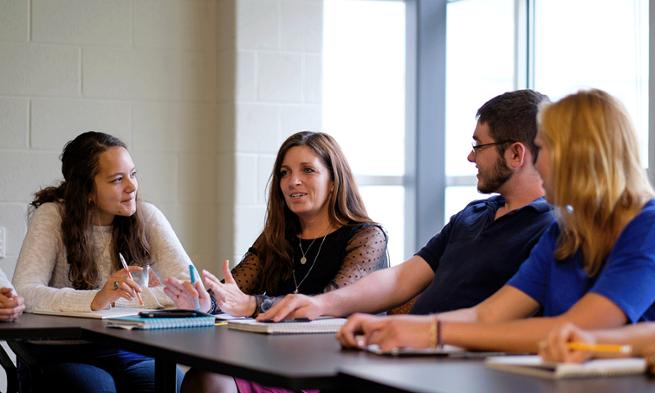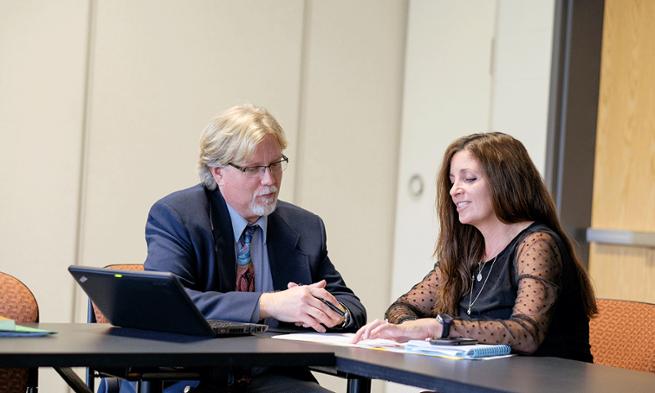A focus on success
Health and Behavior
SUMMARY: Psychology professor Debbie Sturm also serves as Faculty in Residence at Shenandoah Hall, the Honors Learning Community. Her background is in clinical mental health counseling, specializing in clients who have experienced trauma, victims of crime and children in foster care who have experienced abuse and neglect. In this interview with Madison magazine she talks about Honors, psychology and ensuring student success.
Debbie Sturm is the Director of the Counseling Programs in the Department of Graduate Psychology and an assistant professor. She also serves as Faculty in Residence at Shenandoah Hall, the Honors Learning Community.
Why did you choose to be Faculty in Residence?
"My husband Phil is a 49-year-old full-time Honors student majoring in geographic science. (After a career in law enforcement, he decided it was time to pursue his passion for sustainability.) For us as a couple, living in Shenandoah is great. Phil spends much of his time in the ISAT-CS Building, so he just walks across the yard. I work with graduate students, so the chance to be with undergrads was wonderful. This is perfect for us."
What is it like to live with high-achieving students who are new to college life and the JMU campus?
"I felt this would be a very good fit for my skill set. It means that I'm part of the RA, Resident Advisors, program, which is fun, particularly since I was also an RA in college. There is a lightness when I go in the dorm; it feels like my restorative place. Hallway conversations, sitting on the floor talking with students—those moments are really sweet. I look at them and think, 'Your parents must be so proud to have a child like you.'
"A lot of the programming I do blends an awareness of [students'] academic stress with my mental health awareness. ... exercise and time spent outdoors is actually a key to academic success."
"In Shenandoah Hall, our study halls are full. A lot of our kids are in Friday and Saturday night studying or watching movies. During exams Shenandoah Hall vibrates. The hall director and I are the only two people among 400 who don't have finals so we walk around the halls and give out candy and cookies."

How do you help students achieve success in their academic careers?
Phil Frana, interim director of Honors, and I consult on curriculum. We asked our upperclassmen to look back on their first semester—What would I have wanted to know? How can I prepare these new students for the things I wish I had known?
"A lot of the programming I do blends an awareness of their academic stress with my mental health awareness. We did a program right before finals in the spring to show them how exercise and time spent outdoors is actually a key to academic success. We took students out and did yoga with them in a natural environment. I educate students on knowing the differences between stress, anxiety and depression. "
Describe the importance of the psychology discipline.
"Psychology is relevant to everything. It's about core connection—understanding who you are and how you connect to people and systems around you and understanding in turn how those people and systems are connected with each other. Psychology is identity, empathy, community. I don't think there is a discipline you couldn't apply it to."
How do you prepare students for careers helping people who have experienced difficult problems?
"When you are with clients one-on-one, you see how pervasive some problems are. You ask yourself a lot of questions. How do you reach enough people? How do you impact things in a big enough way to make a difference?
"I tell students they will get burnt out. We do a lot of work on self-care and self-awareness. We all hit periods of despair, asking ourselves, 'What is happening in the world?' Feeling powerless is common. We help our students to be able to find a restorative place and see the resilience in people."
So, are you optimistic about the future?
"My worries about how to make a difference were settled once I got in the classroom. You help students become passionate and excited about social justice and advocacy. I am confident that today's students will get out in the system and chip away at societal problems and barriers."
'Regardless of what discipline we are in, understanding how we connect to the natural world is relevant.'
What special projects are you working on?
"I developed an Honors program in Malta, the Psychology of Sustainability and Connection to Nature. It's designed for undergraduates to develop an understanding across disciplines about our connection to the natural world. My family is Maltese, and one of my research areas is how our connection to nature affects mental and physical health. Regardless of what discipline we are in, understanding how we connect to the natural world is relevant. We will examine the psychological connections (biophilia, nature-deficit, ecological self, and ecological identities, for example) as well as mental health, physical health, learning, development, community building, and overall well-being. The seminar would be open to honors students as they complete their freshmen and sophomore years, so I look forward to having some of the students I've gotten to know in Shenandoah Hall on the trip."
